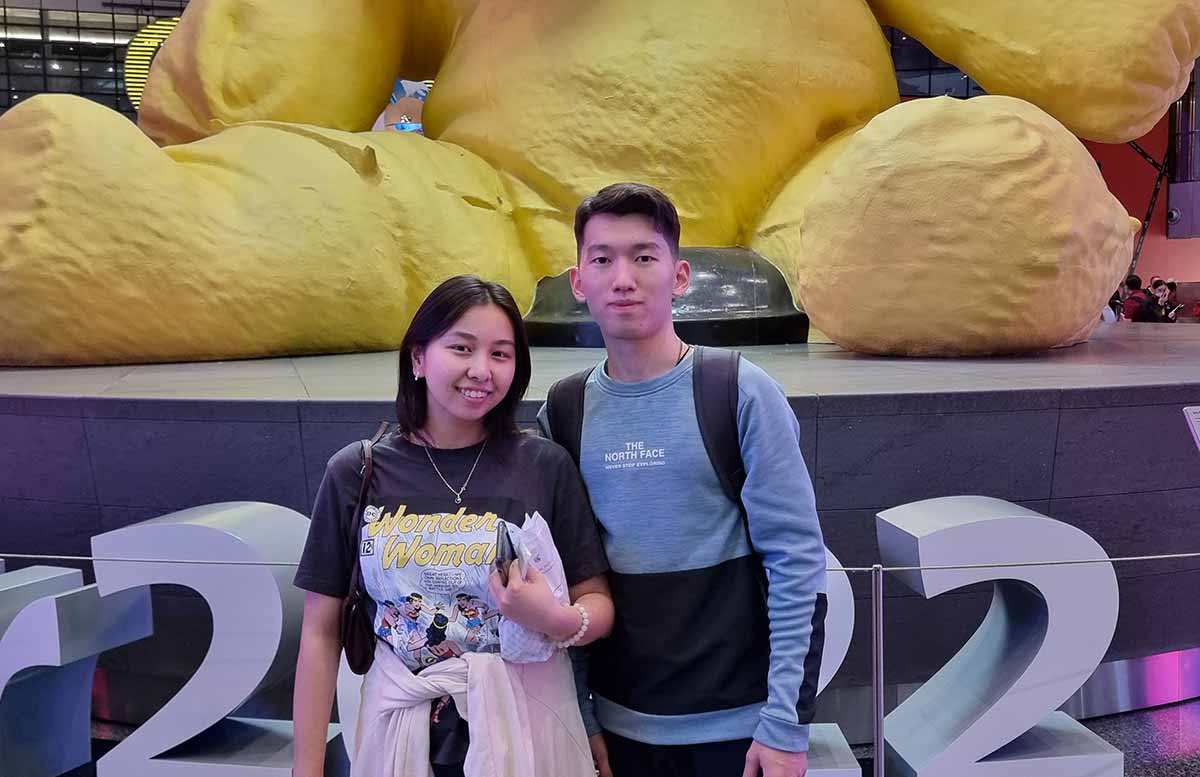
Nursultan with Zhibek Azamat, a high school classmate and second year marketing major at Drexel.
For Nursultan Zhanabay, the path to studying chemical engineering at Drexel
University has roots in his family tree. He comes from generations of oil
industry managers in Kazakhstan, one of Central Asia's largest petroleum
producers. But while Nursultan was inspired to find his own doorway into
this pivotal business, he wanted to take a "sideway" approach focusing more
on the chemical manufacturing process.
The seeds for this direction were initially planted in the chemistry
classroom of Nursultan's high school back home in Atyrau.
“In 10th grade, I had very good chemistry teacher. He opened my mind about
chemistry, about how all this stuff that surrounds us – tables, plastics,
packages, whatever – were made from just elements from organic chemistry,”
he recalled. “I started to like chemistry, and then physics and math, and I
wanted to find a way to wrap everything in one place.”
Nursultan set his sights on America for his college education, ultimately
choosing Drexel for its reputation for research. “I enjoyed the limited
research experience I had in high school, and I knew the quality of
research being done at Drexel would be a big leap forward,” he said. He was
also drawn to Drexel's cooperative education program, which would give him
"better and higher chances to become the professional" in his chosen field.
Now in his second year, Nursultan is fully immersed in a high-altitude
ballooning project to study rapid ozone chemistry changes during a solar
eclipse. He is part of a Drexel engineering team that will travel to
upstate New York to launch a balloon carrying atmospheric instruments to
measure ozone concentration during the April 2024 eclipse. By measuring the
decrease in ozone concentration when sunlight is temporarily blocked, they
aim to better understand ozone production and degradation mechanisms in the
stratosphere. The team has been honing its skills through tethered test
flights both on and off campus to confirm all systems work properly in
demanding high-altitude conditions. They are also collaborating with a
local science class on the project to provide educational outreach.
While he's reached stellar heights academically, Nursultan also emphasizes
the importance of building community. As one of only a handful of Kazakh
students when he arrived on campus, he immediately connected with a
regional group of students from Pakistan, Tajikistan, Georgia, Russia and
other Central Asian countries. And as the Kazakh population of incoming
students has grown each year, Nursultan is looking to start a student
organization specifically for students from his home country.
Nursultan believes while connecting with students from your home country
provides comfort, sticking mostly with familiar faces can inhibit
integration. "Be in the movement," he urges. "Just move around the area,
search all the opportunities. Find people and just talk with them, even
though you are thinking they might be not your friend." By putting himself
out there from the start, Nursultan quickly found his footing in his new
American home. “The first two friends I made, one was from Barbados and one
was American,” he remembered. “They helped me understand the city, how to
get around, what American customs were like, and more.”
With graduation still three years away, Nursultan is weighing options from
returning home to work in industry to diving into PhD research. No matter
what path he takes after Drexel, his appetite for discovery will continue
guiding him upwards.
Learn more about becoming a chemical engineer.